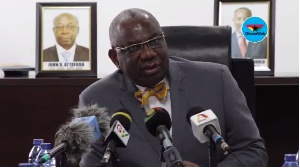 Boakye Agyarko, Minister of Energy,Ghana
Boakye Agyarko, Minister of Energy,Ghana
Four major multinational Oil Marketing Companies Engen Ghana Limited, Total Petroleum Ghana Limited, Vivo Energy Ghana Limited; and Puma Energy Distribution have jointly expressed reservations about the draft local content policy for the downstream sector.
The multinationals in a petition to the Energy Minister, Mr Boakye Keremanteng Agyarko explained that the draft local content policy document does not reflect and cannot achieve the right balances between the competing interest of the local Ghanaian entities and the foreign investors’ interest which have an impact on the Ghanaian economy.
The four multinational OMCs stated in a petition jointly signed by Mr Henry Akwaboah, Managing Director, Engen Ghana Limited; Mr Olivier van Parys, Managing Director, Total Petroleum; Mr Myles Bouvier-Baird, Managing Director, Puma Energy; and Mr Ebenezer Faulkner, Managing Director Vivo Energy.
A copy of the petition obtained by the Ghana News Agency in Accra said the four multinational OMCs explained that even though, “we agree that the petroleum downstream sector in Ghana currently faces several challenges we are of the opinion that the implementation of the arbitrary local content requirements will actually make it harder to overcome the challenges as in any vibrant economy.”
They continued: “The presence of multinational companies such as ours in providing high quality fuels and lubricants to retail and commercial customers is essential to the economic growth whilst increasing the skills and expertise of the local workforce.
“It is important that developing this new policy does not initiate policy directives that are likely to negatively impact on Foreign Direct Investments and erode any gains to be derived from such investment for the sector”.
The multinational OMCs maintained that even though they fully supported the objectives of a local content policy which was aimed at creating local Ghanaian jobs and developing the economy.
“Some of us have had a presence in the Ghanaian market for many decades and are listed on the local stock exchange representing private and individual shareholders, and have always been committed to promoting an effective local valued-added policy for many years.
“This has created local job opportunities and has developed local knowledge and expertise throughout the whole supply chain. Indeed, we are making substantial investments every year to maintain and develop our activities to improve industry standards which have a positive impact on the economy through logistics, service delivery and products at service stations or at customers’ site”.
The four multinational OMCs in the petition stressed that the policy directive seeking to achieve 60 to 100 per cent equity participation for Ghanaian sector in the medium to long term as not practicable considering that the level of investments made come with some corresponding risks.
The four multinational MDs noted that: “Our respective companies belong to the world wide groups and so benefit in many was from international business practices which are passed on locally through technology transfer
“To ensure an impact on our business operations and ultimately on the economy as a whole, and to ensure standards that go with the brand, multinational groups have policies which require them to retain control over their affiliates”.
The multinational OMCs stressed that, restricting the markets in the various areas such as Aviation Marketing, and Bunkering as “unfair to multinationals as investors. It will stifle the evolution of our business and also be a disincentive to any new multinational OMC entering the country”.
The multinationals therefore called for broader consultation with stakeholders on the draft local content policy for the downstream sector to avoid industrial hostilities.